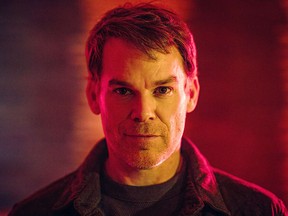How did ‘Dexter’ crack the code of a successful spinoff?

Article content
Reviews and recommendations are unbiased and products are independently selected. Postmedia may earn an affiliate commission from purchases made through links on this page.
This story contains spoilers about “Dexter” and all of its spinoffs.
Clyde Phillips was on a plane recently when a woman approached him, insisting that she knew him from somewhere. Phillips told her a few places where he’s lived – Boston, California, Greenwich Village – but that wasn’t it.
“I’ve seen you on TV,” the woman said.
Phillips replied: “Do you know the show ‘Dexter’?” His fellow passenger was triumphant. “Oh my God, you’re Clyde Phillips,” she said, and asked to take a photo with him.
If Phillips was amused by the encounter, it’s because he doesn’t work in front of the camera. He’s the showrunner, executive producer and writer of Showtime’s long-running “Dexter,” the morbidly humorous crime drama starring Michael C. Hall as a vigilante serial killer who kills only other murderers. Phillips has done enough press that he’s now occasionally recognized in airports or on the street by the show’s most ardent fans.
“I mean, writers don’t get this kind of attention,” Phillips told The Washington Post last month in a video interview. “And that’s because shows like this don’t get this kind of attention.”
By which he means: An old show. It’s been nearly 20 years since “Dexter” debuted to strong ratings, Emmy Awards, giddy weekly recaps and blog chatter. It’s already been around long enough to have wrapped up after a respectable run, gone dormant for a few years and then been rebooted and spun off not one, not two but three times.
For most once-beloved TV series, this would be the death-rattle stage, a last-gasp chapter slapped together to bleed the last dollar out of dwindling but still loyal fan base.
“Dexter,” however, remains in the zeitgeist. Amid a sea of mediocre TV revivals and reboots, Phillips broke the mold with the rare spin-off – “Dexter: Resurrection” – that is drawing enthusiastic reviews from fans and critics.
The premiere, which aired in July, garnered 4.4 million cross-platform viewers and was the most-streamed premiere in Showtime’s history. “Wait, Is ‘Dexter’ Good Again?” asked Vulture, while IndieWire echoed, “‘Dexter: Resurrection’ may actually be … good?” NPR declared that the first episodes were “better than any ‘Dexter’ show has been in years.” Online, fans raved: “It’s absolutely unreal how much better this show is than I expected”; “The new Dexter is so good, it’s actually mind boggling.”
The season finale starts streaming on Friday on Paramount Plus With Showtime – and although there has been no official announcement, Phillips is proceeding with another season as if it has been renewed.
Meanwhile, he keeps a close eye on the discourse. Viewers have appreciated this season’s twist, in which Dexter bonded with a club of fellow serial killers. He’s relieved to find a community that shares his grisly passions, until his moral code compels him to take them out, one by one. This season, tensions are even higher, especially as one of his former close friends has discovered his true identity.
“I’m ashamed to say I’m obsessed with going online and checking out what people are saying,” Phillips said. “People have questions and theories, because they’re very smart viewers. And sometimes their theories are close to what’s going to happen.”
Phillips’s habit of taking fan reaction seriously is one reason the spin-offs continued to work. Based on the book series by Jeff Lindsay, “Dexter” was an instant hit when it debuted in fall 2006 among a plethora of “prestige TV” shows centred on antiheroes, despite Showtime’s executives’ concerns that its violence would scare off viewers. Fans took delight in Hall’s portrayal of Dexter Morgan, who spent his days as a friendly blood-spatter analyst with the Miami police department before his more disturbing nighttime extracurriculars. Hall’s poignant and unexpectedly funny voice-overs helped explain why Dexter operated the way he did, his dark urges stemming from his childhood trauma of seeing his mother murdered in front of him.
Fans felt emotionally connected to the show, which explains their outrage over the conclusion of the original series in 2013, when Dexter fled to Oregon in a fit of self-loathing to become a lumberjack. Phillips wasn’t involved in the show at that point. But after nearly a decade of hearing complaints, he proposed “Dexter: New Blood.” Hall signed on to the 2021 sequel, in which Dexter moved to Upstate New York to reunite with the teenage son he had abandoned.
After it ended – with the son shooting Dexter in the chest and leaving him for dead in the snow-filled woods – Phillips pivoted to a prequel series (“Dexter: Original Sin”) that began airing in December 2024, casting a much-younger actor to flesh out Dexter’s formative years. Following its success, Hall asked Phillips if they could revive his character.
“Dexter’s in my bones, Dexter’s in your bones,” Philips recalls the actor telling him. “Can you figure out a way to un-kill me?”
It took Phillips about a week to come up with the idea for “Resurrection” and successfully pitch it to Showtime. The first episode opens with Dexter in the hospital, having miraculously survived the gunshot. He flees to New York City, where he finds his son Harrison working in a fancy hotel. Because he’s Dexter, he also lands on the trail of a killer who has been killing ride-booking drivers and meets a serial-killer-obsessed billionaire played by Peter Dinklage, with a terrifying henchman played by Uma Thurman.
Phillips was thrilled with the caliber of guest stars this season, but he remained focused on a particularly affecting theme of “Dexter,” as the killer and his son reunite yet again.
“He’s a psychotic and he’s a father,” Phillips said. “He wants a father-and-son relationship. He wants to blend in and hopes that his son doesn’t have what’s in him.”
That is the big question for Harrison, who starts the season by impulsively bashing in the head of a hotel guest who is about to assault a woman. Harrison, unlike his dad, is haunted by his actions – but luckily inherited the “expertly cleaning up murder scenes” gene. Unfortunately, the police still dub him a person of interest.
Jack Alcott, the 20-something actor who plays Harrison, is seeing a markedly different reaction from fans, who have warmed to him after the early resistance he encountered as a new character in the Dexter-verse – not to mention their resentment over him shooting their hero.
“It was a visceral reception both times, which is fantastic,” Alcott said. He laughed. “But if you get to choose between people hating your guts and people really liking you, I think I prefer the latter.”
Alcott treated the filming of the spin-off as “master classes” in acting, he said, for which he showed up to watch even on his days off. His bond with Hall strengthened, particularly during the scenes where Harrison grapples with his own childhood trauma – the death of his mother at the hands of a serial killer (John Lithgow) that Dexter was stalking. Dexter, usually inept with human emotion, does his best to help his son.
“One of the most central pieces of Harrison’s story is just the hurricane that is always sort of spinning inside him,” Alcott said, adding, “Harrison’s got a great idea for what he wants to be … but nothing is ever set in stone. No one’s ever out of the woods in this show.”
That is especially true for a fan-favourite character from the original series, Angel Batista (David Zayas), a Miami detective who always thought of Dexter as his pleasant co-worker and bowling-team pal. Twenty years of red flags later, Batista finally realizes the truth, and goes to Manhattan to convince the police that Dexter is a killer. The more he explains his suspicions, the crazier he sounds.
“To be creating this character for over 10 seasons, over 20 years, it’s a gift,” Zayas told The Post.
In one of the most dramatic scenes in “Resurrection,” Dexter, who continues to evade capture, asks Batista: If he’s correct about Dexter’s true identity, what makes him think this situation will end well for him?
Batista takes his chances, and well – let’s just say that chasing Dexter proves a questionable decision.
“I’m glad they didn’t cop out and made it any different,” Zayas said. “I think the way I end is the way it was supposed to be, and it’s the way that it works for this story of this show.”
Zayas remembers shooting the pilot with Hall, both wondering whether audiences would accept a serial killer protagonist. Little did they know viewers would connect to Dexter simply as a person who is confronting his inner demons.
“This show is unique in how sort of exceptionally weird it is,” Alcott said. “We’re looking at human outliers, the most out-there, the strangest, the darkest sort of pieces of humanity. … And yet, with the fantastic writing that we have and with just the ridiculous performance by Michael C. Hall, it’s also relatable. And I think that’s what makes the show as brilliant as it is.”












Postmedia is committed to maintaining a lively but civil forum for discussion. Please keep comments relevant and respectful. Comments may take up to an hour to appear on the site. You will receive an email if there is a reply to your comment, an update to a thread you follow or if a user you follow comments. Visit our Community Guidelines for more information.